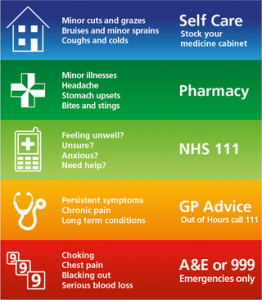When to go to A&E?
Yes, of course you should – if you have a condition that needs it. We are there to help you.
It’s there for you if you are very unwell – especially if you have any of the ‘red flags’ symptoms below. Its main function is to deal with serious and life-threatening illnesses.
If you get the following symptoms, you should to go straight to A&E (or an urgent treatment centre (UTC) or minor illness unit (MIU), if not too unwell) – and not wait to see a GP.
What conditions require A&E?
Here are 4 main groups of problems.
1. Head/Eyes/ENT/neurological
- Headache. Bad headache with neck stiffness and/or light hurting your eyes (photophobia); or a rapid onset with a ‘chop to the back of the neck’. This may be meningitis or a subarachnoid haemorrhage (SAH)
- Weakness on one side of face or body, or loss of speech. This may be a stroke – go to A&E in a hospital with a stroke centre (usually your nearest large regional one; check with NHS111 if not sure)
- Unconscious, or new severe confusion. Or very drowsy and hard to wake
- Eyes. Sudden loss of vision, severe pain or foreign body in the eye, trauma resulting in rapid swelling, any chemical injury
- Mouth. Signs of anaphylaxis (severe allergy), e.g. rapid lip and tongue swelling, wheezing, difficulty breathing
- Throat. Any difficulty breathing, very noisy breathing, choking, unable to swallow own saliva.
2. Heart / lungs
- Heart/chest pain
- Central crushing chest pain, that came on rapidly, spreading to left arm or jaw (especially if linked to nausea/vomiting or sweating, and feeling very unwell)
- Chest pain on breathing in, coughing and moving
- A very fast (or slow) heartbeat that makes you feel unwell, or has caused you to collapse
- Chest/breathing. Severe shortness of breath (especially if struggling to speak in full sentences)
Note. Any child with very fast breathing should be rapidly taken to A&E
3. Abdomen
- Abdominal pain. Severe abdominal pain, especially if:
- Your tummy feels very hard to touch, or you prefer to lie completely still
- It’s linked to recurrent vomiting, high fever, and extreme sweating or clamminess
- Heavy bleeding
- Vomiting alot of blood
- Passing alot of blood in poo or wee
- Heavy vaginal bleeding (more than three pads an hour).
- What constitutes ‘heavy’ bleeding is hard to define. A rule of thumb is enough to make you dizzy or very weak.
- Not passing urine. For more than 12 hours is a concern; over 24 hours means A&E
Note 1: Any child with excessive thirst or excessive urinating (and/or weight loss or lethargy) – indicating possible diabetes – must be offered an urgent GP appointment on the day. If they are drowsy or confused – go to A&E
Note 2. Any child not passing urine for 12 hours
4. Other/trauma
- Suspected sepsis. Sepsis (means bad infection) presents in many ways. Here are typical symptoms. If you feel very unwell and have 2 or more of these:
- S: Shivering / hot / cold
- E: Extreme pain or general discomfort
- P: Pale or discoloured skin
- S: Sleepy, difficulty waking and/or any confusion
- I: ‘I feel like I might die’ (i.e. feeling very unwell)
- S: Shortness of breath
- Fall/suspected fracture. A fall with suspected fracture (especially hip pain)
- Major burns or cuts. This means cuts that will not stop bleeding after 30 mins of pressure, and you think they may need stitching
For Worried Parents / Carers
This is a very useful guide has been produced for parents and carers of children, giving you advice about when to see the GP; and how to treat many common childhood illnesses. We recommend that parents and carers keep a copy handy with their first aid box.
What time to go to A&E
6-7am is the best time. That is when it is quietist. But if you are very unwell, go now.
Summary
We have answered the question ‘should I go to A&E?’ Yes, if you are worried, and especially if you think you may have one the problems above. We hope it has been useful. If you need to go, just go.
Picture Summary


